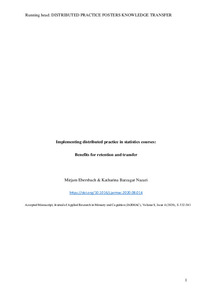Aufsatz

Implementing Distributed Practice in Statistics Courses: Benefits for Retention and Transfer
Zusammenfassung
The present study investigated the effect of distributed versus crammed practice before a course deadline on the retention and transfer of knowledge, and whether learner characteristics moderate the effect. In Experiment 1, only 41% (N = 38) of the initially enrolled students worked the voluntary but recommended practice tasks. Moreover, markedly fewer students did so in the distributed condition (12%) than the crammed practice condition (29%). In Experiment 2, working the practice tasks was mandatory and more students completed them (N = 105, i.e., 81%). Students who distributed practice clearly outperformed students who crammed practice on tests of knowledge retention and transfer five weeks after the practice deadline. No moderating effects of learner characteristics emerged. The study shows that distributed practice following knowledge acquisition is a powerful learning tool for fostering long-term retention and transfer with adults in authentic educational contexts.
Zitierform
In: Journal of Applied Research in Memory and Cognition (JARMAC) Volume 9 / Issue 4 (2020-11-18) , S. 532-541 ; eissn:2211-3681Zitieren
@article{doi:10.17170/kobra-202103253596,
author={Ebersbach, Mirjam and Barzagar Nazari, Katharina},
title={Implementing Distributed Practice in Statistics Courses: Benefits for Retention and Transfer},
journal={Journal of Applied Research in Memory and Cognition (JARMAC)},
year={2020}
}
0500 Oax
0501 Text $btxt$2rdacontent
0502 Computermedien $bc$2rdacarrier
1100 2020$n2020
1500 1/eng
2050 ##0##http://hdl.handle.net/123456789/13047
3000 Ebersbach, Mirjam
3010 Barzagar Nazari, Katharina
4000 Implementing Distributed Practice in Statistics Courses: Benefits for Retention and Transfer / Ebersbach, Mirjam
4030
4060 Online-Ressource
4085 ##0##=u http://nbn-resolving.de/http://hdl.handle.net/123456789/13047=x R
4204 \$dAufsatz
4170
5550 {{Lernverhalten}}
5550 {{Prüfungsvorbereitung}}
5550 {{Lerntechnik}}
5550 {{Statistik}}
7136 ##0##http://hdl.handle.net/123456789/13047
<resource xsi:schemaLocation="http://datacite.org/schema/kernel-2.2 http://schema.datacite.org/meta/kernel-2.2/metadata.xsd"> 2021-07-29T13:31:09Z 2020-11-18 doi:10.17170/kobra-202103253596 http://hdl.handle.net/123456789/13047 eng Attribution-NonCommercial-NoDerivatives 4.0 International http://creativecommons.org/licenses/by-nc-nd/4.0/ distributed practice statistics spacing transfer university course long-term retention 150 Implementing Distributed Practice in Statistics Courses: Benefits for Retention and Transfer Aufsatz The present study investigated the effect of distributed versus crammed practice before a course deadline on the retention and transfer of knowledge, and whether learner characteristics moderate the effect. In Experiment 1, only 41% (N = 38) of the initially enrolled students worked the voluntary but recommended practice tasks. Moreover, markedly fewer students did so in the distributed condition (12%) than the crammed practice condition (29%). In Experiment 2, working the practice tasks was mandatory and more students completed them (N = 105, i.e., 81%). Students who distributed practice clearly outperformed students who crammed practice on tests of knowledge retention and transfer five weeks after the practice deadline. No moderating effects of learner characteristics emerged. The study shows that distributed practice following knowledge acquisition is a powerful learning tool for fostering long-term retention and transfer with adults in authentic educational contexts. open access Ebersbach, Mirjam Barzagar Nazari, Katharina doi:10.1016/j.jarmac.2020.08.014 Lernverhalten Prüfungsvorbereitung Lerntechnik Statistik acceptedVersion eissn:2211-3681 Issue 4 Journal of Applied Research in Memory and Cognition (JARMAC) 532-541 Volume 9 2022-11-19 2022-11-19 false </resource>
Die folgenden Lizenzbestimmungen sind mit dieser Ressource verbunden:


